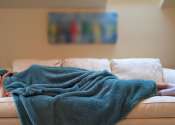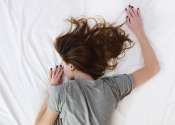Last update:
Sleep disorders news
Cardiology
How experts are using AI to better detect sleep apnea, especially in women
Mayo Clinic researchers have developed an artificial intelligence (AI) algorithm that can identify obstructive sleep apnea (OSA) using the results from an electrocardiogram (ECG)—a common heart test. The innovation could ...
Nov 6, 2025
0
0
Using your phone every night before bed? Researchers say that's okay
Scrolling on your phone before bed may not be as bad for your sleep as we once thought. New research from Toronto Metropolitan University (TMU) and the Université Laval suggests nightly screen use does not contribute to ...
Nov 5, 2025
0
28

Is seasonal affective disorder more than feeling sad? Q&A
Seasonal affective disorder, or SAD, is a type of depression that's related to the changes in seasons. Symptoms typically appear in the fall, worsen through the winter months and eventually go away in the spring or summer.
Nov 5, 2025
0
0

Exploring interactions between gut microbiota and sleep disorders through the brain-gut axis
A comprehensive review published in Brain Medicine illuminates the intricate connections between gut microbiota and sleep regulation, establishing the microbiota-gut-brain axis as a critical pathway in understanding and potentially ...
Nov 4, 2025
0
15

Long-term use of melatonin supplements to support sleep may have negative heart health effects
Long-term use of melatonin supplements, often used to promote sleep and address insomnia, is associated with a higher risk of heart failure diagnosis, heart failure, hospitalization and death from any cause in chronic insomnia, ...
Nov 3, 2025
0
4

Exploring the relationship between sleep and diet
Sleep patterns and eating habits can influence each other, but the link between these behaviors remains unclear. In a new JNeurosci paper, researchers led by William Ja, from the Herbert Wertheim UF Scripps Institute for ...
Nov 3, 2025
0
0

Adenotonsillectomy improves sleep architecture, respiratory outcomes in pediatric obstructive sleep apnea
For pediatric obstructive sleep apnea (OSA), adenotonsillectomy (T&A) significantly improves sleep architecture and respiratory outcomes, according to a study published online Oct. 24 in Laryngoscope.
Nov 2, 2025
0
0

Patient voices reveal the reality of living with the chronic sleep disorder idiopathic hypersomnia
Idiopathic hypersomnia (IH) is a rare, chronic neurological disorder that causes people to feel excessively sleepy during the day, even after getting a full night's rest. Other symptoms include severe difficulty waking up ...

Q&A with neurologist: Why is it so hard to adjust when clocks 'fall back?'
Daylight saving time ends this Sunday at 2:00 a.m. It was introduced in 1918 as a way to conserve energy by making the most of summer's daylight hours. But some people say that shifting our clocks is its own form of energy ...
Oct 31, 2025
0
0

An app, an Apple Watch and AI: A new way for researchers to study sleep health
An app that turns consumer Apple Watches into tools for highly sophisticated sleep stage monitoring was developed by a team of researchers led by professor Joyita Dutta at the University of Massachusetts Amherst. The researchers ...
Oct 30, 2025
0
53

Sleep medicine expert says testing hospitalized patients for sleep apnea saves lives
Despite growing evidence that sleep apnea contributes to cardiovascular disease and can even make it worse, about 50% to 77% of hospitalized patients remain undiagnosed, according to a West Virginia University expert on sleep ...
Oct 30, 2025
0
0

Four research-backed ways to beat the winter blues in the colder months
As winter approaches and daylight saving time is about to end, many people are bracing themselves for shorter days, colder weather and what's often dismissed as the "winter blues." But these seasonal shifts are more than ...
Oct 30, 2025
0
0

Attention lapses due to sleep deprivation coincide with a flushing of fluid from the brain, research reveals
Nearly everyone has experienced it: After a night of poor sleep, you don't feel as alert as you should. Your brain might seem foggy, and your mind drifts off when you should be paying attention.
Oct 29, 2025
0
98

Sleep regularity and other sleep habits in adolescence predict young adult heart health
A study of 307 youth from a diverse population across the United States whose health data were documented from birth into adulthood revealed that earlier sleep timing, more efficient sleep, and less variable sleep patterns ...
Oct 29, 2025
0
0

Clock changes disrupt sleep, health and well-being
This weekend, many people across the country will engage in a twice-a-year ritual: changing their clocks by one hour. At this time of year, "falling back" marks the end of daylight saving time (DST), which was first formally ...
Oct 29, 2025
0
0

Combination of obesity and poor sleep increases risk of multiple chronic diseases
People with poor sleep and obesity have a much higher risk of multimorbidity—having two or more chronic diseases at the same time—University of Queensland researchers have found.
Oct 29, 2025
0
0

Reducing use of sleep drugs could improve quality of life and longevity in older adults
Millions of older Americans suffering from insomnia regularly use prescription sleep medications, despite the risk of serious side effects—such as falls, broken bones, cognitive impairment and dependence—and warnings ...
Oct 28, 2025
0
59

Researchers identify tipping point that leads to rapid sleep onset
In the new study, researchers demonstrated that the human brain falls asleep abruptly, rather than gradually, with a "tipping point" marking the transition from wakefulness into sleep. They were then able to predict the momentary ...
Oct 28, 2025
0
66

Why we used to sleep in two segments, and how the modern shift changed our sense of time
Continuous sleep is a modern habit, not an evolutionary constant, which helps explain why many of us still wake at 3am and wonder if something's wrong. It might help to know that this is a deeply human experience.
Oct 28, 2025
0
1

Heat waves linked to rise in sleep apnea cases in Europe
During heat waves, there is an increase in the number of people suffering with obstructive sleep apnea (OSA), according to a study published in the European Respiratory Journal.
Oct 28, 2025
0
0

What drives sleep problems in long-term care facilities?
Sleep problems affect more than one in five residents in long-term care facilities, with pain, daytime napping and certain medications emerging as key contributors.
Oct 28, 2025
0
0

How HIV disrupts sleep across Africa
HIV significantly affects sleep, with many affected people living in a state akin to chronic jet lag. A new study with Wits researchers published in The Lancet HIV describes how people living with HIV (PLWHIV) experience ...
Oct 27, 2025
0
0

New guideline provides treatment recommendations for central sleep apnea
A new clinical practice guideline developed by a task force of the American Academy of Sleep Medicine provides updated recommendations for the treatment of central sleep apnea.
Oct 27, 2025
0
0

An Indigenous approach shows how changing the clocks for daylight saving time runs counter to human nature
It is that time again. Time to wonder: Why do we turn the clocks forward and backward twice a year? Academics, scientists, politicians, economists, employers, parents—and just about everyone else you will interact with ...
Oct 27, 2025
0
0













































